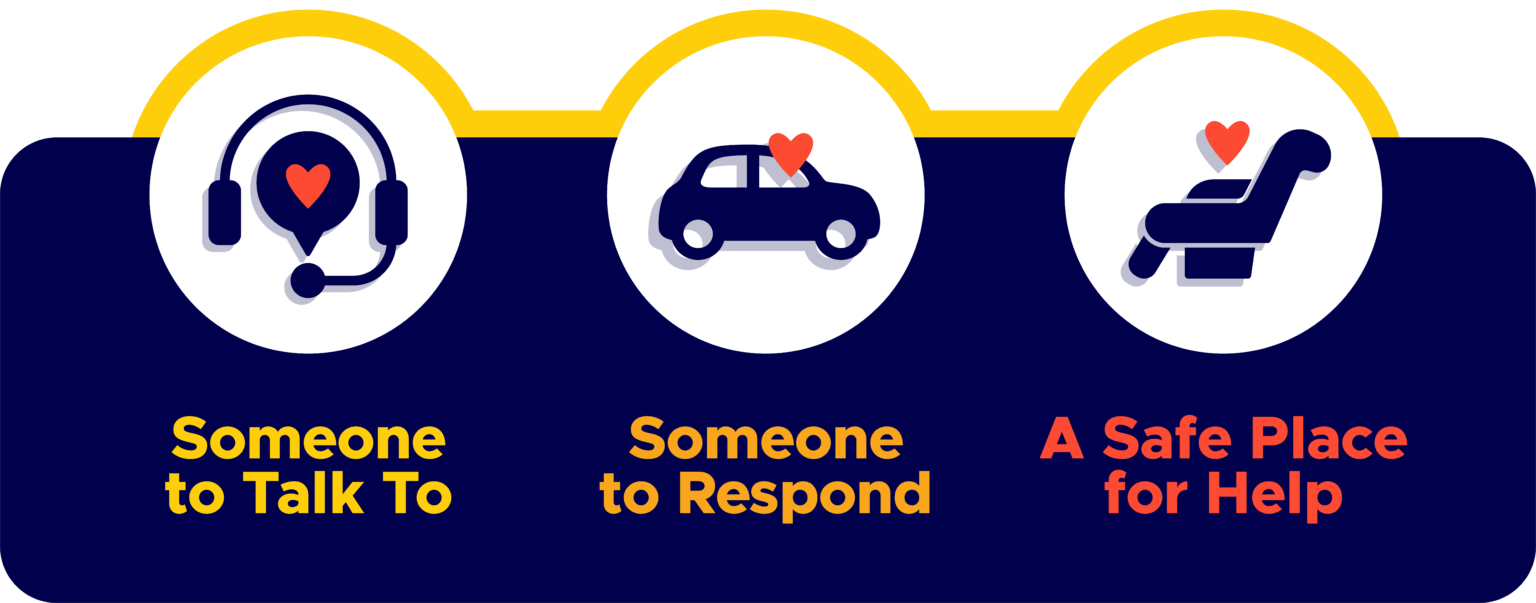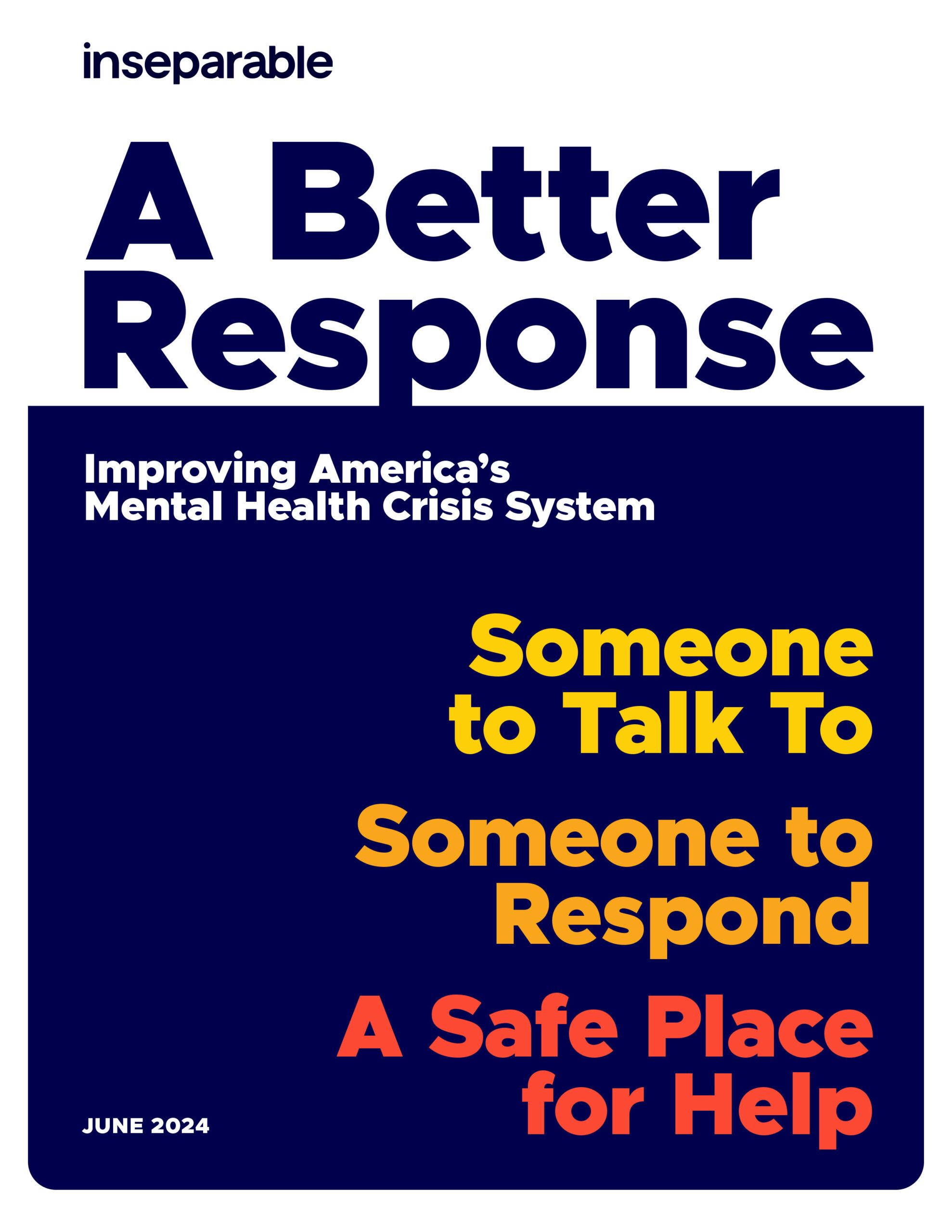No one's worst day should keep them from living their best life.
A Better Response
Policies to Improve America's Mental Health Crisis System
Half of American adults say that their families have experienced a severe mental health emergency. Too often, those in crisis don’t know who to turn to, and many don’t receive the care they need. Fortunately, with appropriate and timely interventions, people can start on a road to recovery.
No one's worst day should keep them from living their best life.
There is a Solution
The crisis continuum of care model offers the promise of a better response, better outcomes, and better use of state and local resources. Learn more about this model in the Better Response report.

States are Reimagining Crisis Response
See your state’s progress in adopting a range of policies to ensure there is someone to talk to, someone to respond, and a safe place for help for anyone, anywhere, at any time. For insights on these policy benchmarks, read this overview.
[{"state":"Alabama","link":"https:\/\/www.inseparable.us\/wp-content\/uploads\/2024\/06\/Inseparable-2024CrisisReport-AL-final.pdf","label":"See Snapshot"},{"state":"Alaska","link":"https:\/\/www.inseparable.us\/wp-content\/uploads\/2024\/06\/Inseparable-2024CrisisReport-AK-final.pdf","label":"See Snapshot"},{"state":"Arizona","link":"https:\/\/www.inseparable.us\/wp-content\/uploads\/2024\/06\/Inseparable-2024CrisisReport-AZ-final.pdf","label":"See Snapshot"},{"state":"Arkansas","link":"https:\/\/www.inseparable.us\/wp-content\/uploads\/2024\/06\/Inseparable-2024CrisisReport-AR-final.pdf","label":"See Snapshot"},{"state":"California","link":"https:\/\/www.inseparable.us\/wp-content\/uploads\/2024\/06\/Inseparable-2024CrisisReport-CA-final.pdf","label":"See Snapshot"},{"state":"Colorado","link":"https:\/\/www.inseparable.us\/wp-content\/uploads\/2024\/06\/Inseparable-2024CrisisReport-CO-final.pdf","label":"See Snapshot"},{"state":"Connecticut","link":"https:\/\/www.inseparable.us\/wp-content\/uploads\/2024\/06\/Inseparable-2024CrisisReport-CT-final.pdf","label":"See Snapshot"},{"state":"Delaware","link":"https:\/\/www.inseparable.us\/wp-content\/uploads\/2024\/06\/Inseparable-2024CrisisReport-DE-final.pdf","label":"See Snapshot"},{"state":"District of Columbia","link":"https:\/\/www.inseparable.us\/wp-content\/uploads\/2024\/06\/Inseparable-2024CrisisReport-DC-final.pdf","label":"See Snapshot"},{"state":"Florida","link":"https:\/\/www.inseparable.us\/wp-content\/uploads\/2024\/06\/Inseparable-2024CrisisReport-FL-final.pdf","label":"See Snapshot"},{"state":"Georgia","link":"https:\/\/www.inseparable.us\/wp-content\/uploads\/2024\/06\/Inseparable-2024CrisisReport-GA-final.pdf","label":"See Snapshot"},{"state":"Hawaii","link":"https:\/\/www.inseparable.us\/wp-content\/uploads\/2024\/06\/Inseparable-2024CrisisReport-HI-final.pdf","label":"See Snapshot"},{"state":"Idaho","link":"https:\/\/www.inseparable.us\/wp-content\/uploads\/2024\/06\/Inseparable-2024CrisisReport-ID-final.pdf","label":"See Snapshot"},{"state":"Illinois","link":"https:\/\/www.inseparable.us\/wp-content\/uploads\/2024\/06\/Inseparable-2024CrisisReport-IL-final.pdf","label":"See Snapshot"},{"state":"Indiana","link":"https:\/\/www.inseparable.us\/wp-content\/uploads\/2024\/06\/Inseparable-2024CrisisReport-IN-final.pdf","label":"See Snapshot"},{"state":"Iowa","link":"https:\/\/www.inseparable.us\/wp-content\/uploads\/2024\/06\/Inseparable-2024CrisisReport-IA-final.pdf","label":"See Snapshot"},{"state":"Kansas","link":"https:\/\/www.inseparable.us\/wp-content\/uploads\/2024\/06\/Inseparable-2024CrisisReport-KS-final.pdf","label":"See Snapshot"},{"state":"Kentucky","link":"https:\/\/www.inseparable.us\/wp-content\/uploads\/2024\/06\/Inseparable-2024CrisisReport-KY-final.pdf","label":"See Snapshot"},{"state":"Louisiana","link":"https:\/\/www.inseparable.us\/wp-content\/uploads\/2024\/06\/Inseparable-2024CrisisReport-LA-final.pdf","label":"See Snapshot"},{"state":"Maine","link":"https:\/\/www.inseparable.us\/wp-content\/uploads\/2024\/06\/Inseparable-2024CrisisReport-ME-final.pdf","label":"See Snapshot"},{"state":"Maryland","link":"https:\/\/www.inseparable.us\/wp-content\/uploads\/2024\/06\/Inseparable-2024CrisisReport-MD-final.pdf","label":"See Snapshot"},{"state":"Massachusetts","link":"https:\/\/www.inseparable.us\/wp-content\/uploads\/2024\/06\/Inseparable-2024CrisisReport-MA-final.pdf","label":"See Snapshot"},{"state":"Michigan","link":"https:\/\/www.inseparable.us\/wp-content\/uploads\/2024\/06\/Inseparable-2024CrisisReport-MI-final.pdf","label":"See Snapshot"},{"state":"Minnesota","link":"https:\/\/www.inseparable.us\/wp-content\/uploads\/2024\/06\/Inseparable-2024CrisisReport-MN-final.pdf","label":"See Snapshot"},{"state":"Mississippi","link":"https:\/\/www.inseparable.us\/wp-content\/uploads\/2024\/06\/Inseparable-2024CrisisReport-MS-final.pdf","label":"See Snapshot"},{"state":"Missouri","link":"https:\/\/www.inseparable.us\/wp-content\/uploads\/2024\/06\/Inseparable-2024CrisisReport-MO-final.pdf","label":"See Snapshot"},{"state":"Montana","link":"https:\/\/www.inseparable.us\/wp-content\/uploads\/2024\/06\/Inseparable-2024CrisisReport-MT-final.pdf","label":"See Snapshot"},{"state":"Nebraska","link":"https:\/\/www.inseparable.us\/wp-content\/uploads\/2024\/06\/Inseparable-2024CrisisReport-NE-final.pdf","label":"See Snapshot"},{"state":"Nevada","link":"https:\/\/www.inseparable.us\/wp-content\/uploads\/2024\/06\/Inseparable-2024CrisisReport-NV-final.pdf","label":"See Snapshot"},{"state":"New Hampshire","link":"https:\/\/www.inseparable.us\/wp-content\/uploads\/2024\/06\/Inseparable-2024CrisisReport-NH-final.pdf","label":"See Snapshot"},{"state":"New Jersey","link":"https:\/\/www.inseparable.us\/wp-content\/uploads\/2024\/06\/Inseparable-2024CrisisReport-NJ-final.pdf","label":"See Snapshot"},{"state":"New Mexico","link":"https:\/\/www.inseparable.us\/wp-content\/uploads\/2024\/06\/Inseparable-2024CrisisReport-NM-final.pdf","label":"See Snapshot"},{"state":"New York","link":"https:\/\/www.inseparable.us\/wp-content\/uploads\/2024\/06\/Inseparable-2024CrisisReport-NY-final.pdf","label":"See Snapshot"},{"state":"North Carolina","link":"https:\/\/www.inseparable.us\/wp-content\/uploads\/2024\/06\/Inseparable-2024CrisisReport-NC-final.pdf","label":"See Snapshot"},{"state":"North Dakota","link":"https:\/\/www.inseparable.us\/wp-content\/uploads\/2024\/06\/Inseparable-2024CrisisReport-ND-final.pdf","label":"See Snapshot"},{"state":"Ohio","link":"https:\/\/www.inseparable.us\/wp-content\/uploads\/2024\/06\/Inseparable-2024CrisisReport-OH-final.pdf","label":"See Snapshot"},{"state":"Oklahoma","link":"https:\/\/www.inseparable.us\/wp-content\/uploads\/2024\/06\/Inseparable-2024CrisisReport-OK-final.pdf","label":"See Snapshot"},{"state":"Oregon","link":"https:\/\/www.inseparable.us\/wp-content\/uploads\/2024\/06\/Inseparable-2024CrisisReport-OR-final.pdf","label":"See Snapshot"},{"state":"Pennsylvania","link":"https:\/\/www.inseparable.us\/wp-content\/uploads\/2024\/06\/Inseparable-2024CrisisReport-PA-final.pdf","label":"See Snapshot"},{"state":"Rhode Island","link":"https:\/\/www.inseparable.us\/wp-content\/uploads\/2024\/06\/Inseparable-2024CrisisReport-RI-final.pdf","label":"See Snapshot"},{"state":"South Carolina","link":"https:\/\/www.inseparable.us\/wp-content\/uploads\/2024\/06\/Inseparable-2024CrisisReport-SC-final.pdf","label":"See Snapshot"},{"state":"South Dakota","link":"https:\/\/www.inseparable.us\/wp-content\/uploads\/2024\/06\/Inseparable-2024CrisisReport-SD-final.pdf","label":"See Snapshot"},{"state":"Tennessee","link":"https:\/\/www.inseparable.us\/wp-content\/uploads\/2024\/06\/Inseparable-2024CrisisReport-TN-final.pdf","label":"See Snapshot"},{"state":"Texas","link":"https:\/\/www.inseparable.us\/wp-content\/uploads\/2024\/06\/Inseparable-2024CrisisReport-TX-final.pdf","label":"See Snapshot"},{"state":"Utah","link":"https:\/\/www.inseparable.us\/wp-content\/uploads\/2024\/06\/Inseparable-2024CrisisReport-UT-final.pdf","label":"See Snapshot"},{"state":"Vermont","link":"https:\/\/www.inseparable.us\/wp-content\/uploads\/2024\/06\/Inseparable-2024CrisisReport-VT-final.pdf","label":"See Snapshot"},{"state":"Virginia","link":"https:\/\/www.inseparable.us\/wp-content\/uploads\/2024\/06\/Inseparable-2024CrisisReport-VA-final.pdf","label":"See Snapshot"},{"state":"Washington","link":"https:\/\/www.inseparable.us\/wp-content\/uploads\/2024\/06\/Inseparable-2024CrisisReport-WA-final.pdf","label":"See Snapshot"},{"state":"West Virginia","link":"https:\/\/www.inseparable.us\/wp-content\/uploads\/2024\/06\/Inseparable-2024CrisisReport-WV-final.pdf","label":"See Snapshot"},{"state":"Wisconsin","link":"https:\/\/www.inseparable.us\/wp-content\/uploads\/2024\/06\/Inseparable-2024CrisisReport-WI-final.pdf","label":"See Snapshot"},{"state":"Wyoming","link":"https:\/\/www.inseparable.us\/wp-content\/uploads\/2024\/06\/Inseparable-2024CrisisReport-WY-final.pdf","label":"See Snapshot"}]
A Better Response:
Improving America's Mental Health Crisis System
The Better Response report features effective policy solutions states can adopt to ensure that people experiencing a mental health emergency receive the appropriate care they need when they need it. The policy recommendations are organized under the following five areas designed to help states reimagine their crisis response systems:
- Establish sustainable financing
- Ensure system accountability
- Build system infrastructure
- Develop workforce capacity
- Promote a culture of service
Policy Recommendations
- Fund 988 call centers and related services through a small federally-authorized telecom fee, similar to 911 surcharges on phone bills
- Maximize federal funding by applying for a three-year enhanced Medicaid match rate of 85% for mobile response services
- Ensure commercial insurance covers mobile crisis response in the same manner as EMS and ambulance services
- Direct the state insurance department to enforce federal commercial coverage requirements for crisis receiving and stabilization services
- Invest state general funds that provide flexibility to cover system development and non-billable costs
- Require state-regulated payers to cover all recommended billing codes in Sustainable Funding for Mental Health Crisis Services
- Require Medicaid and commercial insurers to reimburse providers at rates that cover costs of care
- Require data collection, analysis, and reporting throughout the crisis response system
- Include crisis system measurement, information-sharing, and performance standards in Medicaid contracts
- Facilitate coordination and information sharing with other emergency response systems, like 911, and key system stakeholders and partners
- Establish a state advisory board of key stakeholders to inform development and improvement of crisis response systems
- Ensure annual reporting to legislative bodies, including any gaps, needs, regulatory barriers, and recommendations, to ensure the delivery of best practice crisis services
- Adopt definitions, across all payers, that are consistent with SAMHSA’s best practice guidelines for 988 call centers, mobile response, 23-hour crisis receiving and stabilization services, crisis residential services, peer respite, and in-home stabilization services
- Ensure dedicated crisis-related transportation options that reduce reliance on law enforcement
- Leverage technology to allow first responders, schools, and others to connect users with a mental health professional through a virtual platform
- Develop capacity for all three components of crisis response, including youth-specific services
- Support warm lines and peer-run crisis respite to provide an appropriate level of support to people with less acute struggles
- Permit on-site medication storage and dispensing for crisis receiving and stabilization and crisis residential facilities
- Incorporate peer services into crisis response systems
- Enact liability protections for crisis response staff and facilities
- Update licensing and credentialing standards to include a range of crisis response professionals, paraprofessionals, and facilities
- Support training and retention of specialized crisis response staff
- Require mobile response providers to “just go” when requested and prohibit providers from triaging calls or refusing to serve certain people, places, or times
- Require crisis providers to “just serve” anyone in crisis and prohibit providers from rejecting a person as “too acute,” “too agitated,” or “too intoxicated,” and from specifying a percentage of patients that may be refused
- Establish population-specific services to meet community needs
